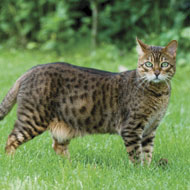
Owners urged to keep cats indoors overnight
A spate of killings in London has led to calls for pet owners to keep their animals indoors overnight.
Two weeks ago a decapitated cat was discovered in North London. Another was discovered in Guildford, Surrey last Monday, and another on Thursday in Kent.
During March more cats were found dead in the areas of Richmond, Streatham and Tottenham.
According to South Norwood Animal Rescue and Liberty (SNARL), who have been collecting information on the dead cats, the recent killings have been linked to a surge of mutilations carried out by the same person.
A message on the charity's Facebook page states that there have been upwards of 50 cats, rabbits and foxes found dead, apparently murdered, across London over the past few years.
Its vets have examined eight cats that had been mutilated and are in the process of conducting post-mortems on a further 12. The charity are also sifting through 80–100 reports of other cases also thought to be linked.
It was first thought that whoever was behind the killings operated exclusively in the area of Croydon. But, speaking to The Guardian, SNARL’s founder Boudica Rising said that as news of the killings spread, bodies started turning up further afield:
“We’ve had attacks from Luton all the way down to Surrey across to Farnborough, Richmond, Finchley, Stepney - basically pretty much within the M25 and outside of it,” she said.
The charity add that police are well aware of the issue and are running an active investigation.
Until the killings subside, anyone who finds a dead cat is asked to contact the charity immediately. SNARL also urge owners within the M25 area to keep their pets indoors overnight.



 The latest
The latest